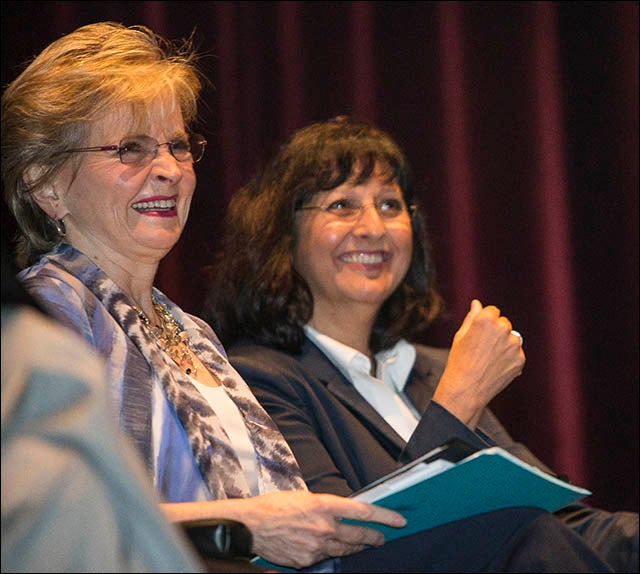‘A FOUNDATIONAL SKILL’
State superintendent delivers address on literacy at ECU summit

North Carolina State Superintendent of Public Instruction June Atkinson, left, and Marianna Walker, dean of the ECU Honors College, enjoy a laugh at the Interdisciplinary Literacy Summit held on campus May 21. Atkinson was the keynote speaker for the event.
The changing definition of literacy and the constant evolution of teaching methods were major topics at the first-ever Interdisciplinary Literacy Summit, held May 21 at East Carolina University.
Marianna Walker, dean of the ECU Honors College, and Sarah Williams, director of the Walter and Marie Williams STEPP Program, collaborated to organize the inaugural campus-wide initiative.
“Literacy serves as a foundation to learning and expression of knowledge in all disciplines,” Walker said.
“There are many components to literacy including reading, writing, and oral language. This literacy summit was developed to foster an interdisciplinary discussion on issues involving student literacy competencies, especially in the adult (college) population and in the transition from high school to the university setting.”
North Carolina State Superintendent of Public Instruction June Atkinson delivered the keynote address, titled “Student Literacy: Now and in the Future.” She told the audience that the N.C. Department of Public Instruction and the State Board of Education are taking every step to ensure literacy is a focus throughout the curriculum.
The state released new standards in almost every K-12 subject in 2010, she said, as opposed to creating new standards one course at a time over several years. Students are now learning how areas from one subject, such as language arts or history, can be applied to other subjects.
Atkinson said that in her visits to classrooms across the state, she is inspired by how teachers have used the standards to personalize and differentiate instruction. Through new teaching methods and lesson plans, students are embracing the wide range of literacy as it is written, spoken, read and comprehended.
She also noted that educators are taking an interdisciplinary approach to learning.
Challenges to literacy include early learning and encouraging children to read when school is not in session. Programs such as NC Pre-K and Give 5 Read 5, which encourages summer reading, are aimed at boosting literacy rates. Citing a recent study from Harvard University, Atkinson stressed that students lose a large amount of reading progress when they go home in the summer with no books at home.
“If students can read just five books over the summer, they’ll have a better chance of not having reading loss,” said Atkinson.
Atkinson said the state also aims to surround students with opportunities to be literate individuals in an ever-changing world.
“Reading is a foundation skill. What was good enough for one child in the past will not be good enough for another child in the future,” she said.
Following the keynote address, ECU faculty members and educators from Pitt County Schools participated in several literacy-based challenges. The groups met in Joyner Library to discuss and chart topics such as the different challenges faced in addressing student literacy in preparation for transition to college; how each group would define literacy and what is needed to assess, instruct and research literacy; and what knowledge and skills must be in place for success related to literacy development. The groups were also tasked with outlining a research project and designing a collaborative initiative related to achieving literacy.
Participating faculty included professors of speech-language pathology, special education, psychology, English, communication, reading education and foreign languages.
The Interdisciplinary Literacy Summit is part of the Barbara Bremer Distinguished Lecture Series. It is funded by Dr. Chris Bremer, professor emeritus of family medicine in the Brody School of Medicine, and his wife, Barbara, a retired speech language pathologist. Through an endowed professorship, the series and summit, Barbara Bremer’s passion for collaboration in literacy and language will continue for decades.
Walker is the current Bremer Distinguished Scholar in Literacy and Language Disorders.
The summit was co-sponsored by the Divisions of Academic Affairs and Health Sciences, the Department of Communication Sciences and Disorders in the College of Allied Health Sciences and the Walter and Marie Williams STEPP Program.